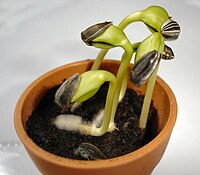
Photo from wikipedia
Extreme temperatures, drought and salinity stress adversely affect seed germination and seedling growth in crop species. Seed priming has been recognized as an indispensable technique in the production of stress-tolerant… Click to show full abstract
Extreme temperatures, drought and salinity stress adversely affect seed germination and seedling growth in crop species. Seed priming has been recognized as an indispensable technique in the production of stress-tolerant plants. Seed priming increases seed water content, improves protein synthesis using mRNA and DNA and repair mitochondria in seeds prior to germination. The current study aimed to determine the role of biostimulants-seed-priming during germination and seedling growth of Ceratotheca triloba (Bernh.) Hook.f. (an indigenous African leafy vegetable) under low temperature, low osmotic potential and salinity stress conditions. Ceratotheca triloba seeds were primed with biostimulants [smoke-water (SW), synthesized smoke-compound karrikinolide (KAR1), Kelpak® (commercial seaweed extract), phloroglucinol (PG) and distilled water (control)] for 48h at 25°C. Thereafter, primed seeds were germinated at low temperatures, low osmotic potential and high NaCl concentrations. Low temperature (10°C) completely inhibited seed germination. However, temperature shift to 15°C improved germination. Smoke-water and KAR1 enhanced seed germination with SW improving seedling growth under different stress conditions. Furthermore, priming seeds with Kelpak® stimulated percentage germination, while PG and the control treatment improved seedling growth at different PEG and NaCl concentrations. Generally, high concentrations of PEG and NaCl brought about detrimental effects on seed germination and seedling growth. Findings from this study show the potential role of seed priming with biostimulants in the alleviation of abiotic stress conditions during seed germination and seedling growth in C. triloba plants.
Journal Title: Ecotoxicology and environmental safety
Year Published: 2018
Link to full text (if available)
Share on Social Media: Sign Up to like & get
recommendations!